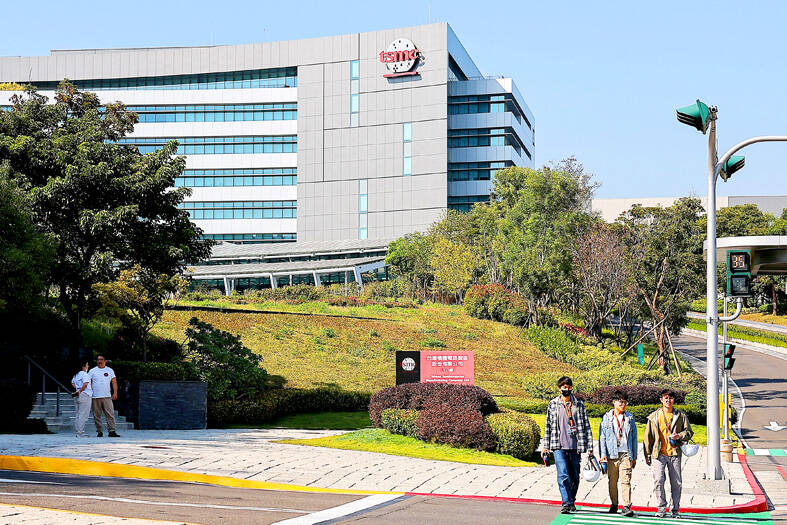Taiwan Semiconductor Manufacturing Co (TSMC, 台積電) retained the No. 1 title in the global pure-play wafer foundry business in the third quarter of this year, seeing its market share growing to 64.9 percent to leave South Korea’s Samsung Electronics Co, the No. 2 supplier, further behind, Taipei-based TrendForce Corp (集邦科技) said in a report.
TSMC posted US$23.53 billion in sales in the July-September period, up 13.0 percent from a quarter earlier, which boosted its market share to 64.9 percent, up from 62.3 percent in the second quarter, the report issued on Monday last week showed.
TSMC benefited from the debut of flagship smartphone products, as well as strong demand for high-performance computing (HPC) devices, which helped it report an increase in revenue in the third quarter, the report said.

Photo: REUTERS/Ann Wang
The chipmaker also saw an increase in production capacity utilization and wafer shipments, it said.
On the other hand, Samsung, with its clients’ products approaching the end of the life cycle and the company facing rising competition in mature processes from Chinese rivals, posted US$3.36 billion in sales in the third quarter, down 12.4 percent from a quarter earlier, the report said.
Despite retaining the No. 2 position, Samsung’s market share fell to 9.3 percent in the third quarter, down from 11.5 percent in the second quarter, leaving it further behind TSMC, according to TrendForce.
In the third quarter, the aggregate sales of the world’s top pure-play wafer foundry operators stood at about US$34.9 billion, up 9.1 percent from a quarter earlier and breaking the record set during the COVID-19 pandemic, the report said.
TrendForce attributed part of the growth to the substantial contributions from the advanced 3-nanometer (nm) process.
China’s Semiconductor Manufacturing International Corp (中芯) came in third place after posting US$2.17 billion in revenue in the third quarter and a market share of 6.0 percent, ahead of Taiwan’s United Microelectronics Corp (聯電) with US$1.87 billion in revenue and a 5.2 percent market share, and US-based GlobalFoundries Inc with US$1.74 billion in revenue and a 4.8 percent market share, the report showed.
China’s Huahong Group (華虹) took the sixth spot after generating US$799 million in revenue in the third quarter and securing a 2.2 percent market share.
It was followed by Israel’s Tower Semiconductor Ltd with US$371 million, or 1 percent, Taiwan’s Vanguard International Semiconductor Corp (世界先進) with US$366 million, or 1 percent, Taiwan’s Powerchip Semiconductor Manufacturing Corp (力積電) with US$336 million, or 0.9 percent, and China’s NexChip Co (晶合集成) with US$332 million, or 0.9 percent, the report added.
TrendForce said robust global demand for emerging technologies is expected to boost sales of the world’s top 10 pure-play wafer foundry operators in the fourth quarter, with a tight supply in sophisticated 5nm and 3nm processes expected to fail to meet solid demand.
However, demand for mature processes, which refers to the 28nm and lower-end technologies, would see little change or rise slightly in the fourth quarter, TrendForce said.

Macronix International Co (旺宏), the world’s biggest NOR flash memory supplier, yesterday said it would spend NT$22 billion (US$699.1 million) on capacity expansion this year to increase its production of mid-to-low-density memory chips as the world’s major memorychip suppliers are phasing out the market. The company said its planned capital expenditures are about 11 times higher than the NT$1.8 billion it spent on new facilities and equipment last year. A majority of this year’s outlay would be allocated to step up capacity of multi-level cell (MLC) NAND flash memory chips, which are used in embedded multimedia cards (eMMC), a managed

In Italy’s storied gold-making hubs, jewelers are reworking their designs to trim gold content as they race to blunt the effect of record prices and appeal to shoppers watching their budgets. Gold prices hit a record high on Thursday, surging near US$5,600 an ounce, more than double a year ago as geopolitical concerns and jitters over trade pushed investors toward the safe-haven asset. The rally is putting undue pressure on small artisans as they face mounting demands from customers, including international brands, to produce cheaper items, from signature pieces to wedding rings, according to interviews with four independent jewelers in Italy’s main

CULPRITS: Factors that affected the slip included falling global crude oil prices, wait-and-see consumer attitudes due to US tariffs and a different Lunar New Year holiday schedule Taiwan’s retail sales ended a nine-year growth streak last year, slipping 0.2 percent from a year earlier as uncertainty over US tariff policies affected demand for durable goods, data released on Friday by the Ministry of Economic Affairs showed. Last year’s retail sales totaled NT$4.84 trillion (US$153.27 billion), down about NT$9.5 billion, or 0.2 percent, from 2024. Despite the decline, the figure was still the second-highest annual sales total on record. Ministry statistics department deputy head Chen Yu-fang (陳玉芳) said sales of cars, motorcycles and related products, which accounted for 17.4 percent of total retail rales last year, fell NT$68.1 billion, or

In the wake of strong global demand for AI applications, Taiwan’s export-oriented economy accelerated with the composite index of economic indicators flashing the first “red” light in December for one year, indicating the economy is in booming mode, the National Development Council (NDC) said yesterday. Moreover, the index of leading indicators, which gauges the potential state of the economy over the next six months, also moved higher in December amid growing optimism over the outlook, the NDC said. In December, the index of economic indicators rose one point from a month earlier to 38, at the lower end of the “red” light.